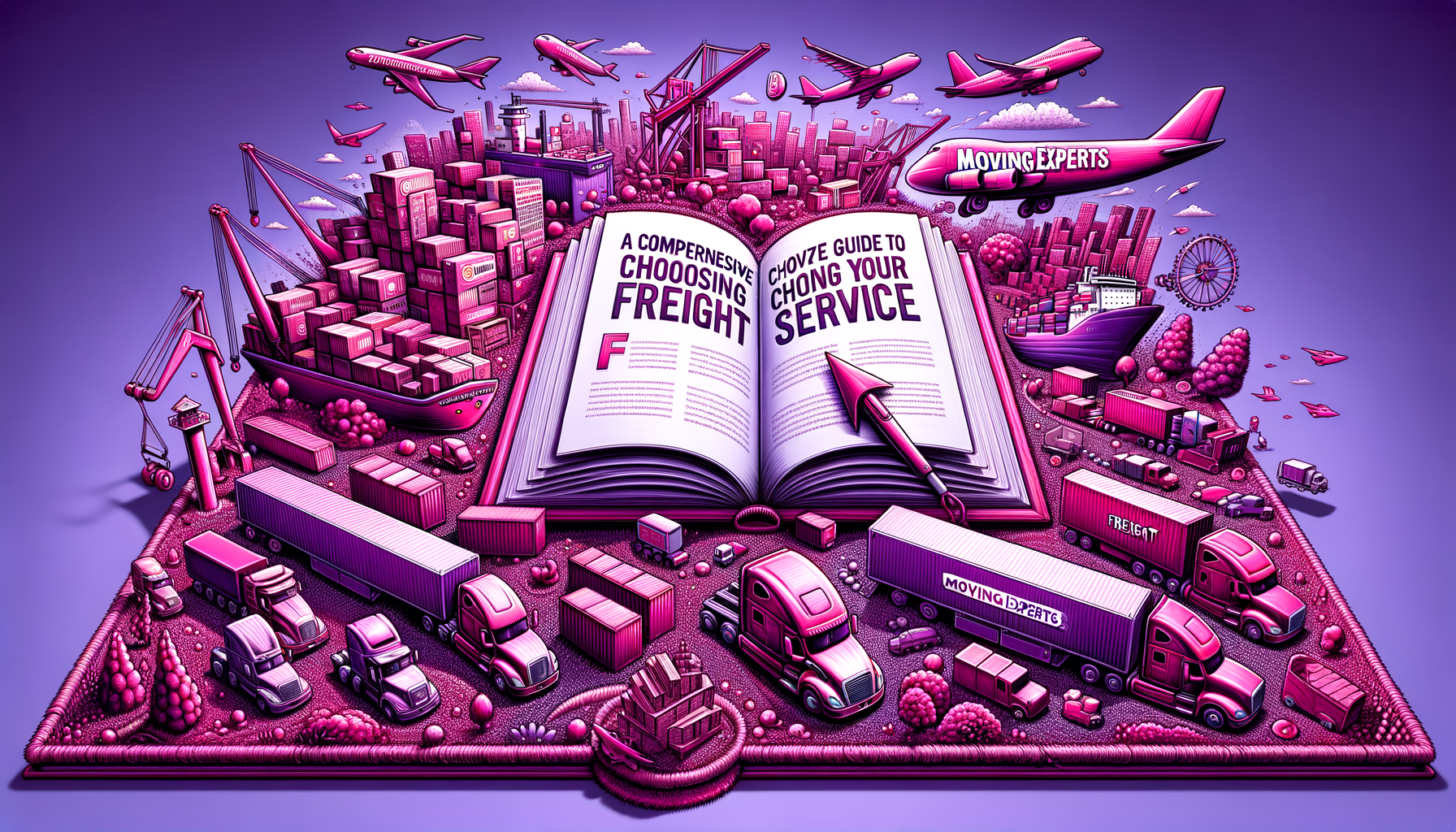 A Comprehensive Guide to Choosing Your Freight Service
A Comprehensive Guide to Choosing Your Freight Service
Choosing the right freight service for your needs can be a daunting task. With so many options available, it’s important to understand the basics of freight shipping and consider various factors before making a decision. In this comprehensive guide, we will explore everything you need to know about choosing the most suitable freight service for your specific requirements.
Understanding Freight Services
Before diving into the intricacies of selecting a freight service, it’s essential to have a solid understanding of what freight services entail. Freight shipping is the transportation of goods from one location to another using various modes of transportation, such as planes, trains, trucks, and ships. It is a crucial aspect of many businesses’ supply chain operations, facilitating the movement of goods domestically and internationally.
The Basics of Freight Shipping
To fully grasp the complexities of freight shipping, it’s important to familiarize yourself with the basics. Freight shipments typically involve the transportation of large and heavy items that cannot be easily delivered via traditional shipping methods. These shipments are usually categorized based on their size, weight, and specific requirements, such as temperature control or hazardous materials handling.
One key aspect of freight shipping is the concept of freight class. Freight class is a standardized classification system that categorizes shipments based on their density, stowability, handling, and liability. This classification system helps determine the appropriate pricing and handling requirements for each shipment. Understanding the freight class of your goods is crucial in selecting the right freight service and ensuring accurate pricing.
Types of Freight Services
When it comes to freight services, there are several options to choose from, each catering to different needs. Some common types of freight services include less than truckload (LTL), full truckload (FTL), air freight, ocean freight, and intermodal transportation. Understanding the characteristics and advantages of each type will help you narrow down the options and select the most suitable service for your shipment.
For example, LTL freight services are ideal for smaller shipments that don’t require a full truckload. This option allows multiple shippers to share the same truck, reducing costs and maximizing efficiency. On the other hand, FTL freight services are suitable for larger shipments that require the entire capacity of a truck. This option provides dedicated transportation for your goods, ensuring faster transit times and reduced handling.
Key Terms in Freight Shipping
Freight shipping comes with its own set of terms and jargon. Familiarizing yourself with these terms will make it easier for you to communicate with freight service providers and understand the details of your shipment. Some important terms to know include bill of lading, freight class, accessorial charges, and delivery confirmation.
The bill of lading is a legal document that serves as a contract between the shipper and the carrier. It outlines the details of the shipment, such as the type of goods, quantity, and destination. Freight class, as mentioned earlier, determines the pricing and handling requirements of the shipment. Accessorial charges refer to additional services or fees that may be incurred during the shipping process, such as liftgate service or inside delivery. Finally, delivery confirmation provides proof that the shipment has been successfully delivered to its destination.
By familiarizing yourself with these key terms, you’ll be able to navigate the freight shipping process with confidence and make informed decisions that align with your business needs.
Factors to Consider When Choosing a Freight Service
Now that you have a solid foundation in freight services, let’s explore the key factors you should consider when choosing a freight service provider.
When it comes to freight services, there are several factors that can greatly impact your decision-making process. In addition to the cost considerations, speed and efficiency, and service reliability mentioned earlier, there are a few more aspects that deserve your attention.
Customer Support and Communication
Effective communication and reliable customer support are vital when it comes to freight services. You want to work with a provider that is responsive and readily available to address any concerns or queries you may have. Look for companies that offer multiple channels of communication, such as phone, email, and online chat, so you can easily reach out to them whenever needed. A freight service provider that values clear and open communication will ensure that you are well-informed throughout the shipping process, providing you with peace of mind.
Specialized Services
Depending on the nature of your business and the type of goods you need to transport, you may require specialized freight services. It’s important to consider whether the provider you choose offers any specialized services that align with your specific requirements. For example, if you deal with perishable goods, you may need a provider that offers temperature-controlled shipping options. Similarly, if you handle hazardous materials, you’ll want to ensure that the provider has the necessary certifications and expertise to handle such shipments safely and in compliance with regulations.
Technology and Innovation
In today’s digital age, technology plays a significant role in the freight industry. When selecting a freight service provider, it’s worth considering their technological capabilities and level of innovation. Look for companies that leverage advanced systems and software to streamline their operations and enhance efficiency. For example, providers that offer online shipment tracking, automated documentation, and real-time updates can greatly simplify the shipping process for you. Embracing technology not only improves the overall experience but also demonstrates a commitment to staying ahead in an ever-evolving industry.
Environmental Sustainability
As the world becomes increasingly conscious of environmental issues, it’s important to consider the environmental impact of your freight service provider. Look for companies that prioritize sustainability and have implemented eco-friendly practices. This can include initiatives such as using fuel-efficient vehicles, optimizing routes to minimize carbon emissions, and investing in renewable energy sources. By choosing a freight service provider that is committed to reducing its environmental footprint, you can contribute to a greener future while meeting your shipping needs.
By taking these additional factors into account, you can make a well-informed decision when choosing a freight service provider that not only meets your immediate needs but also aligns with your long-term goals and values.
Evaluating Freight Service Providers
Once you have considered the key factors, it’s time to evaluate specific freight service providers. Let’s explore some important aspects to consider during this evaluation process.
Reputation and Reviews
Check the reputation of the freight service providers you are considering. Look for customer reviews and testimonials to gauge their level of professionalism and service quality. Reputable providers will have positive feedback from satisfied customers, indicating their commitment to excellence. Additionally, consider reaching out to industry peers or business contacts for recommendations based on their experiences with freight service providers.
It’s worth noting that reputation is not solely based on positive reviews. Negative feedback can also provide valuable insights into a provider’s weaknesses and areas for improvement. By carefully analyzing both positive and negative reviews, you can gain a more comprehensive understanding of a freight service provider’s strengths and limitations.
Customer Service
Effective customer service is vital when dealing with any freight service provider. Evaluate the provider’s responsiveness, willingness to address your concerns, and ability to provide personalized assistance. Customer service representatives should be knowledgeable, reliable, and proactive in resolving any issues that may arise. Prompt and clear communication with the provider will contribute to a smoother shipping experience overall.
Furthermore, consider the provider’s approach to customer service beyond problem-solving. Look for providers who go the extra mile to ensure customer satisfaction. This can include proactive updates on shipment status, proactive notifications of potential delays, and a willingness to accommodate special requests. A freight service provider that prioritizes customer service will not only meet your expectations but also exceed them.
Technology and Tracking Capabilities
In today’s digital age, technology plays a significant role in the freight shipping industry. Invest time in understanding the technology and tracking capabilities offered by potential providers. Look for features such as online tracking portals, real-time updates, and electronic documentation. These technological advancements will not only enhance your overall experience but also facilitate better visibility and control over your shipments.
Moreover, consider the provider’s investment in future-proof technology. As the industry continues to evolve, it’s crucial to partner with a freight service provider that stays ahead of the curve. Providers who embrace emerging technologies such as artificial intelligence, blockchain, and data analytics can offer innovative solutions that streamline your supply chain and improve efficiency.
The Role of Freight Forwarders
In some cases, engaging a freight forwarder can be beneficial for your shipping needs. Let’s delve into the topic of freight forwarders and their advantages in the logistics landscape.
When it comes to international shipping, the process can be complex and overwhelming. From navigating customs regulations to coordinating multiple transportation services, there are numerous challenges that can arise. This is where freight forwarders step in to make your life easier.
What is a Freight Forwarder?
A freight forwarder is an intermediary who acts as a liaison between the shipper and various transportation services. They coordinate the movement of goods on behalf of the shipper, leveraging their industry knowledge and networks to ensure smooth and efficient transportation. Freight forwarders handle documentation, customs requirements, and other logistical aspects, making them valuable partners in the shipping process.
Imagine you are a small business owner looking to export your products to a new market. Without a freight forwarder, you would have to navigate the complex web of shipping regulations, customs paperwork, and transportation logistics on your own. This can be a daunting task, especially if you are unfamiliar with the intricacies of international shipping. However, by engaging a freight forwarder, you can leave these responsibilities in the hands of professionals who specialize in this field.
Benefits of Using Freight Forwarders
Freight forwarders offer several benefits to shippers. They have extensive knowledge of the shipping industry, including regulations, customs requirements, and trade practices. This expertise saves you time and effort, allowing you to focus on other aspects of your business. Additionally, freight forwarders have established relationships with carriers, enabling them to negotiate competitive rates and secure space for your shipments.
Let’s say you have a time-sensitive shipment that needs to reach its destination as quickly as possible. A freight forwarder can tap into their network of carriers and select the most efficient transportation option for your specific needs. They can also handle any unexpected delays or issues that may arise during transit, ensuring that your goods reach their destination on time.
Moreover, freight forwarders provide end-to-end visibility and tracking of your shipments. They use advanced technology and systems to keep you informed about the status of your goods throughout the entire shipping process. This level of transparency gives you peace of mind and allows you to plan your operations more effectively.
Selecting a Freight Forwarder
When selecting a freight forwarder, consider their industry experience, reputation, and range of services. Assess their ability to handle your specific types of shipments and ensure they have connections in the regions where you need transportation. Request references and inquire about their certifications or affiliations with industry associations. It’s important to establish a good working relationship with your freight forwarder, as they will be instrumental in ensuring smooth shipping operations.
Remember, not all freight forwarders are created equal. Take the time to research and find a partner who aligns with your business goals and values. By choosing the right freight forwarder, you can unlock a world of opportunities and streamline your shipping operations, ultimately improving your overall logistics efficiency.
Legal and Insurance Aspects of Freight Services
Freight shipping entails legal and insurance considerations. Understanding these aspects will help you mitigate risks and take appropriate measures to protect your goods during transportation.
When it comes to freight insurance, it’s important to recognize that not all coverage is created equal. Different insurance options may offer varying levels of protection, so it’s crucial to choose a freight service that aligns with your specific needs. Take the time to inquire about the insurance options available and carefully review the terms and conditions of the policy. By doing so, you can ensure that you have adequate coverage in the event of unforeseen circumstances, such as theft, accidents, or natural disasters.
Understanding Freight Insurance
Freight insurance is a vital component of protecting your goods against loss or damage during shipping. It provides financial compensation in the event of unforeseen circumstances, such as theft, accidents, or natural disasters. When choosing a freight service, inquire about the insurance options available and assess whether their coverage aligns with your needs. It’s essential to review the terms and conditions of the insurance policy to fully understand the coverage and any exclusions.
Moreover, it’s worth noting that some freight services may offer additional insurance options beyond the standard coverage. These options may include specialized coverage for high-value goods, perishable items, or hazardous materials. If your shipment falls into any of these categories, it’s crucial to discuss these specific requirements with your chosen freight service provider to ensure that you have the appropriate level of insurance protection.
Legal Considerations in Freight Shipping
Freight shipping involves complying with various regulations and legal requirements. These may include customs documentation, permits, and licenses. It’s crucial to familiarize yourself with the legal obligations associated with your specific shipments. Failure to comply with the applicable regulations can result in delays, fines, and other repercussions. Consider consulting with legal experts or freight service providers who can guide you in navigating the legal aspects of freight shipping.
Additionally, it’s important to stay informed about any changes or updates in the legal landscape of freight shipping. Regulations and requirements can vary from country to country, and even within different regions or states. By staying up-to-date with the latest developments, you can ensure that your shipments remain compliant and avoid any potential legal pitfalls.
Finalizing Your Freight Service Choice
Once you have considered all the relevant factors and evaluated potential providers, it’s time to finalize your freight service choice. Here are some essential steps to take during this final stage.
Contract Negotiation Tips
Before committing to a freight service provider, negotiate the terms of your agreement. Pay attention to important details such as pricing, liability limits, and dispute resolution mechanisms. Seek clarification on any ambiguous clauses and ensure that the contract reflects your expectations and requirements. Engaging legal counsel during this process can provide added confidence and protect your interests.
Preparing for Your First Shipment
Once you have chosen a freight service provider, it’s important to prepare for your first shipment adequately. Collaborate with the provider to gather all the necessary documentation, such as bill of lading and customs forms. Ensure that your goods are appropriately packaged, labeled, and secured for transportation. Follow any specific instructions provided by the freight service provider to avoid any delays or issues during the shipping process.
Ongoing Relationship Management with Your Freight Service Provider
Building a strong and productive working relationship with your freight service provider is beneficial in the long run. Maintain open lines of communication and provide feedback to help them improve their services. Regularly evaluate the provider’s performance and address any concerns promptly. Cultivating a mutually beneficial partnership will ensure a smooth and efficient shipping experience for all your future shipments.
Choosing the right freight service provider is a critical decision that can significantly impact your business operations. By understanding freight services, considering relevant factors, and evaluating providers, you can make an informed choice that aligns with your specific needs.
However, it’s important to delve deeper into the world of freight shipping to truly optimize your logistics processes. One aspect to consider is the various modes of transportation available. Depending on the nature of your goods and the distance they need to travel, you may choose to utilize different modes such as air, sea, or land transportation. Each mode has its own advantages and considerations, so it’s crucial to assess which one best suits your requirements.
Another factor to explore is the role of technology in the freight industry. With the advent of digital platforms and tracking systems, you can now have real-time visibility into the location and status of your shipments. This not only provides peace of mind but also allows you to proactively address any potential issues that may arise during transit. Embracing technology can streamline your logistics processes and enhance overall efficiency.
Remember to pay attention to legal and insurance aspects as well. Familiarize yourself with the applicable laws and regulations governing freight transportation, both domestically and internationally. Additionally, ensure that your goods are adequately insured to protect against any unforeseen events or damages that may occur during transit.
Establishing a strong relationship with your chosen provider is crucial, but it’s also beneficial to explore alternative options. Maintaining a network of trusted freight service providers can provide flexibility and contingency plans in case of unexpected disruptions or changes in your shipping requirements.
With this comprehensive guide, you are empowered with the knowledge and resources to confidently navigate the realm of freight shipping and optimize your logistics processes. By following these steps and continuously evaluating and adapting your approach, you can ensure a seamless and efficient freight service experience that supports the growth and success of your business.





